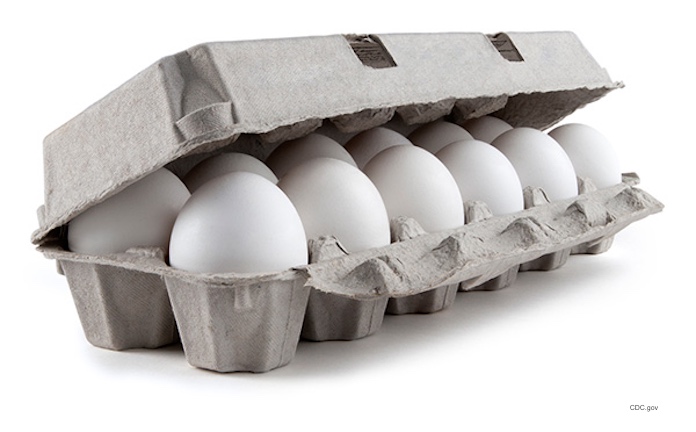A Salmonella Braenderup outbreak linked to Rose Acre Farms shell eggs is being investigated by the CDC, FDA, and state officials. Don’t eat, serve, or sell the recalled shell eggs, which are sold under several brand names. The eggs were sold under several brand names, including Coburn Farms, Country Daybreak, Crystal Farms, Food Lion, Glenview, Great Value, Nelms, Publix, Sunshine Farms, and Sunups. Check for eggs with plant number P-1065 and a Julian date between 011 and 102, or plant number P-1359D and Julian date 048A or 049A with Best By dates of APR 02 and APR 03.

If you have any of these recalled eggs, throw them out, then wash and sanitize the refrigerator drawers and shelves that held them. If you have eaten these eggs and have been sick with the symptoms of a Salmonella infection, which include vomiting, diarrhea, nausea, and a fever, see your doctor. You should contact your doctor immediately if you have a high fever, over 101.5°F, diarrhea for more than 3 days, bloody stools, prolonged vomiting, and signs of dehydration.
You should know that you must handle eggs carefully, since they can and often do harbor pathogenic bacteria that can cause illness. Eggs can seem perfectly fine. The pathogenic bacteria will not change their appearance, smell or texture. Eating raw or lightly cooked eggs is a health hazard.
Consumers should consider buying and using pasteurized eggs and egg products. Keep eggs refrigerated at 40°F or colder at all times. Only buy eggs from stores and suppliers that keep them refrigerated.
When you are using eggs, look at them carefully. Discard cracked or dirty eggs. Handle them carefully, and avoid cross-contamination. Wash your hands after touching them. Also wash your countertops, utensils, dishes, and cutting boards with soap and water after working with eggs.
The main issue is that poultry can carry bacteria inside their ovaries. That means the eggs will be contaminated even before the shell is formed. Eggs can also be contaminated from the droppings of poultry in the laying process, or from the environment.
Even if you keep hens, you are still at risk. Supervise children when they are around eggs and chicks, and don’t let children under the age of 5 handle or touch chicks, ducklings, or other poultry. Keep a clean coop. Do not wash chicken food and water dishes indoors. And collect eggs often. Clean eggs with fine sandpaper, a brush, or cloth. Don’t wash eggs, because colder water can pull bacteria into the egg.
You should not eat the recalled eggs, even if they are cooked thoroughly. But in general, cook eggs until the white and yolk are firm. All egg dishes should be cooked to 160°F or hotter. Make sure that foods make with raw or lightly cooked eggs, such as hollandaise sauce and salad dressings, are only. made with pasteurized eggs. And refrigerate cooked eggs and foods containing eggs promptly after cooking.
Pritzker Hageman law firm helps people sickened by contaminated food get answers, compensation and justice. Our lawyers have represented patients and families of children in personal injury and wrongful death lawsuits against food manufacturers, restaurants, retailers, schools, and others. Attorney Fred Pritzker and his team recently won a a multimillion dollar judgment on behalf of a child who needed brain surgery after a Salmonella infection. If you have a question about this outbreak, ask us about it and leave a comment about this story. We will keep you informed as more information is released.




